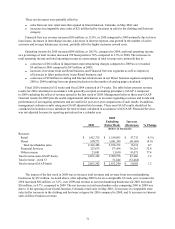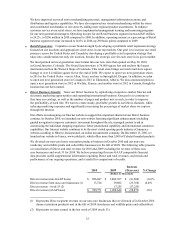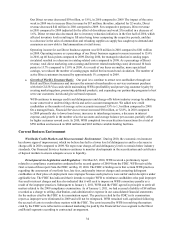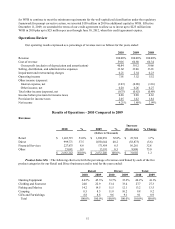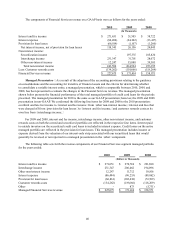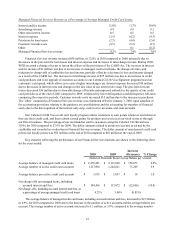Cabela's 2010 Annual Report Download - page 45
Download and view the complete annual report
Please find page 45 of the 2010 Cabela's annual report below. You can navigate through the pages in the report by either clicking on the pages listed below, or by using the keyword search tool below to find specific information within the annual report.35
In May 2009, the CARD Act was signed into law. Some provisions were effective in August 2009, but many
of the provisions became effective in February 2010 and August 2010. The CARD Act has and will continue to
affect various credit card practices of card issuers, including our Financial Services business, such as marketing,
underwriting, pricing, billing, and disclosure. For example, the CARD Act and related regulations restrict our
ability to increase interest rates on existing credit card balances, charge over-limit fees, and charge fees for making
a payment. The CARD Act provisions also further define acceptable due dates, payment allocations, disclosure
requirements, and “reasonable” fees, and prohibit increasing the interest rates on variable-rate credit card accounts
that are subject to a fixed-rate floor. As a result of the CARD Act, revenue from our Financial Services business
was negatively impacted. Beginning in February 2011, the third phase of the CARD Act requires creditors that
increased annual percentage rates due to credit criteria, market conditions, or other factors on or after January 1,
2009, to review accounts at least every six months to determine whether the annual percentage rate should be
reduced, which could result in reduced interest income. The CARD Act also requires the Federal Reserve to
conduct various studies regarding interchange fees, credit limit reductions, financial literacy, marketing, and credit
card terms and conditions. Future legislation or regulations may be issued as a result of these studies. The full
impact of the remaining CARD Act requirements on WFB is unknown at this time due to the uncertainty of the
results of these studies.
On July 21, 2010, the Reform Act was signed into law. The Reform Act makes extensive changes to the laws
regulating financial services firms and credit rating agencies and requires significant rule-making. In addition,
the legislation mandates multiple studies which could result in additional legislative or regulatory action. WFB is
currently reviewing the impact the Reform Act will have on its business.
The Reform Act imposes a moratorium on the approval of applications for FDIC insurance for an industrial
bank, credit card bank, or trust bank that is owned by a commercial firm. Furthermore, the FDIC must, under most
circumstances, disapprove any change in control that would result in direct or indirect control by a commercial
firm of a credit card bank, such as WFB. For purposes of this provision, a company is a “commercial firm” if
its consolidated annual gross revenues from activities that are financial in nature and, if applicable, from the
ownership or control of one or more insured depository institutions, in the aggregate, represent less than 15%
of its consolidated annual gross revenues. The Reform Act does not, however, eliminate the exception from the
definition of “bank” under the BHCA for credit card banks, such as WFB. In addition, the Reform Act directs the
Comptroller General of the United States to complete a study within 18 months of the Reform Act’s enactment to
determine whether it is necessary, in order to strengthen the safety and soundness of institutions or the stability
of the financial system, to eliminate certain exceptions under the BHCA, including the exception for credit card
banks. If the credit card bank exception were eliminated or modified, we may be required to divest our ownership
of WFB unless we were willing and able to become a bank holding company under the BHCA. Any such forced
divestiture would materially adversely affect our business and results of operations.
The Reform Act established the new independent Bureau which will have broad rulemaking, supervisory,
and enforcement authority over consumer products, including credit cards. The Bureau will be directed to prevent
“unfair, deceptive, or abusive practices” and ensure that all consumers have access to markets for consumer
financial products and services, and that such markets are fair, transparent, and competitive. States are permitted
to adopt stricter consumer protection laws and state officials can enforce consumer protection rules issued by the
Bureau.
The Reform Act will also affect a number of significant changes relating to asset-backed securities, including
additional oversight and regulation of credit rating agencies and additional reporting and disclosure requirements.
Among other things, the Reform Act requires the federal banking agencies and the SEC to prescribe regulations
to require securitizers to retain an economic interest in securitized assets, generally at a level of not less than
five percent. The Reform Act also requires the SEC to adopt regulations regarding the use of representations
and warranties in the market for asset-backed securities. In addition, the Reform Act will prohibit issuers and
payment card networks from placing restrictions on vendors relating to credit card transactions, which could
affect consumer behavior and the use of credit cards as a form of payment. The changes resulting from the Reform
Act may impact our profitability, require changes to certain of WFB’s business practices, impose upon WFB








